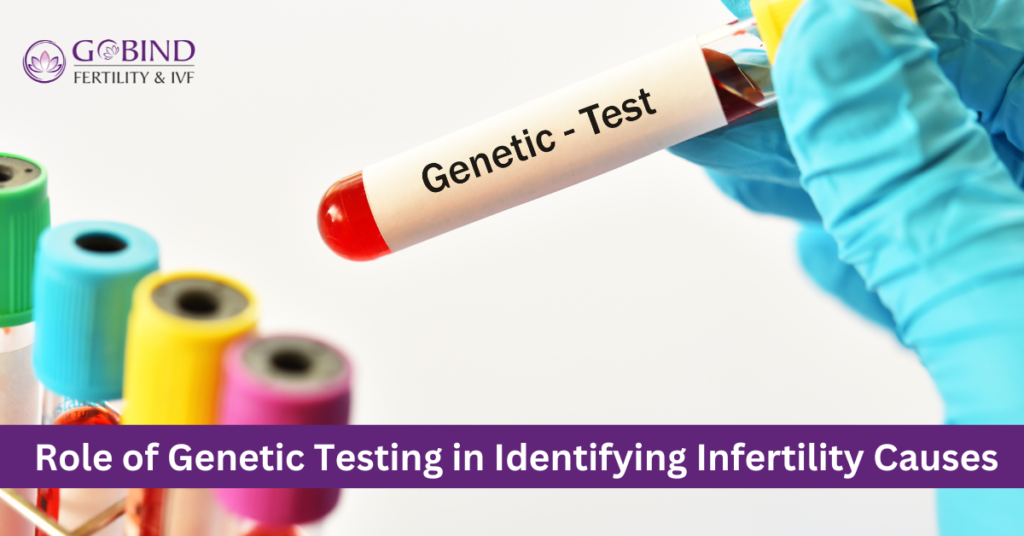The Role of Genetic Testing in Identifying Infertility Causes

Nowadays, Infertility is one of the most distressing issues faced by millions of couples worldwide. As medical technology advances, genetic testing has shown promising results in diagnosing the root causes of infertility. This diagnostic tool is now an essential part of fertility assessments, providing valuable insights into the genetic factors that may contribute to infertility. One of the leading fertility centres in Hisar helping couples navigate this journey is Gobind Fertility & IVF Centre, which utilizes genetic testing to tailor fertility treatments more effectively and improve patient outcomes.
Understanding Genetic Testing and Its Relevance to Infertility
Genetic testing involves analyzing a person’s DNA to identify changes or mutations in genes that could affect reproductive health. These genetic mutations may cause a range of issues, such as reduced egg or sperm quality, implantation failure, and recurrent miscarriage. By identifying these genetic factors early on, fertility specialists can provide more precise and personalized treatment plans. At Gobind Fertility & IVF Centre, genetic testing is used as part of the infertility evaluation to detect underlying genetic abnormalities that could hinder natural conception.
Types of Genetic Testing for Infertility
- Carrier Screening: Carrier Screening identifies whether either partner carries genes for inherited disorders such as cystic fibrosis, sickle cell anaemia, or Tay-Sachs disease. It also helps in determining whether there’s an increased risk of passing on genetic disorders to the offspring, which can affect fertility outcomes.
- Karyotyping: Karyotyping is a genetic test used to analyze an individual’s chromosomes. It can detect chromosomal abnormalities that can cause infertility or miscarriage. At Gobind Fertility & IVF Centre, karyotyping is often recommended for individuals experiencing repeated miscarriages or unexplained infertility.
- Single Gene Testing: Single Gene Testing is used to evaluate specific genetic mutations that are linked to infertility, causing male factor infertility or ovarian reserve issues. Male infertility can sometimes be linked to genetic mutations in the Y chromosome, and women may have mutations that impact their ovarian function.
- Genetic Screening of Embryos (PGT-A): For couples undergoing in vitro fertilization (IVF), preimplantation genetic testing for aneuploidy (PGT-A) helps identify embryos with abnormal chromosome numbers. Gobind Fertility & IVF Centre uses advanced PGT-A technology and selects genetically healthy embryos to increase the chances of a successful pregnancy.
How Genetic Testing Benefits Fertility Treatment
- Personalized Fertility Treatment Plans: Genetic testing enables fertility specialists to create customized treatment strategies based on the genetic makeup of the couple. For example, suppose one partner carries a gene that affects sperm quality. In that case, Dr Manju Khurana – one of the best Fertility specialists at Gobind Fertility & IVF Centre can recommend specific fertility treatments such as sperm retrieval techniques, IVF, or sperm donation.
- Improved IVF Success Rates: By using PGT-A and other genetic tests, fertility specialists can select the most viable embryos for transfer, reducing the risk of miscarriage and increasing the likelihood of a healthy pregnancy.
- Early Identification of Genetic Disorders: For couples concerned about passing on genetic disorders to their children, genetic testing can identify potential risks before conception.
- Reduced Emotional and Financial Burden: Fertility treatments can make anyone emotional. Genetic testing can help identify the most likely causes of infertility, allowing couples to pursue the most effective treatments early in the process.
The Future of Genetic Testing in Fertility
As genetic testing continues to evolve, its role in identifying infertility causes is growing. Advances in genomic technologies promise precise and comprehensive tests that can predict fertility challenges before they arise. The future holds the potential for more non-invasive testing methods, such as blood tests, which could further simplify the diagnostic process.
For couples facing infertility challenges, genetic testing provides a beacon of hope. Centres like Gobind Fertility & IVF Centre are leading the charge by integrating genetic testing into their services, offering couples a clearer understanding of their fertility issues and the best path forward.
Conclusion
Genetic testing is a revolutionary tool in the diagnosis and treatment of infertility. It allows for a more thorough understanding of the genetic factors that can affect reproductive health, providing fertility specialists with the necessary information to design targeted, effective treatment plans. Whether through carrier screening, karyotyping, or PGT-A, genetic testing has transformed the way infertility is addressed, bringing new hope to many couples seeking to start or grow their families.
